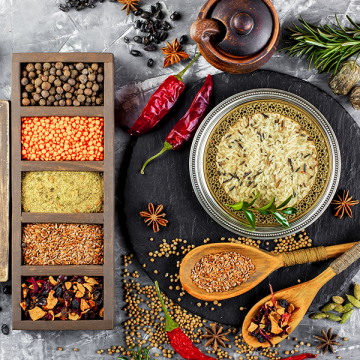

Year 11 Food Studies Units 1 and 2
Overview
In Unit 1 you will start with a historical and cultural perspective about the origins of food, and investigate the role of food through time and across the world. In particular, you will look at the general progression from hunter-gatherer to rural-based agriculture, to today’s urban living and global trade in food. You will take a look at Australian indigenous food prior to European settlement and how food patterns have changed since, particularly through the influence of food production, processing and manufacturing industries and immigration. You will have the opportunity to investigate cuisines that are part of Australia’s culinary identity today and reflect on the concept of an Australian cuisine.
In Unit 2, you will shift your focus to commercial food production industries, as well as food production in the home. You will gain an insight into the significance of food industries to the Australian economy and investigate the capacity of the food industry to provide safe, high-quality food that meets the needs of today’s consumers. You will learn about evaluation measures designed to compare home cooked meals to commercial products. You will also have the opportunity to design new food products and adapt recipes to suit particular needs and circumstances. Finally, you will have the opportunity to reflect on how you could one day turn your knowledge about food and food preparation into a lucrative business opportunity.
Who is it for?
This is for students who have a passion for food and who are curious about their food and where it comes from. Enrolling in this subject can be a useful additional food subject for students who are already studying VET Hospitality. This is because you gain an appreciation about the origins of food, issues and trends in food production and processing in Australia, and food safety and hygiene in the food industry. It is a great start for any student wanting to go onto study food, nutrition or hospitality.
What do you do?
In this subject you will have the opportunity to interact with and share your knowledge of the subject through weekly discussion forums, short quizzes, and practical tasks.
What skills do you need?
- A basic understanding of food preparation and presentation skills
- Understanding of how to read and follow a recipe independently
- How to use equipment in the kitchen safely
- Food safety and hygiene skills when handling and preparing food
An understanding of how to use video or a camera on a device such as a mobile phone, to record their practical work, and then basic skills in being able to download and share this material with their Food Studies teacher at VSV.
What skills do you develop?
Students develop a variety of skills including:
- Sensory evaluation skills, such as how to use the senses to make comparisons and form judgements about the food you make
- How to be an informed consumer and make informed decisions about the food you purchase and prepare
- How to analyse and discuss current issues and trends in Australia’s food system
- Research skills about historical influences on food production, processing and manufacturing
Requirements
- Students need to have access to a basic, functional kitchen in good working order with basic kitchen equipment and utensils.
- Students need to purchase their own ingredients for their practical tasks.
- Students need access to a device to be able to take photos or a video recording about their practical work, such as a mobile phone.
- Students must have an email address that they check on a daily basis, as this is a key method of how your teacher will communicate with you.
Things to think about
Most students assume that this subject will teach them how to cook new foods they have never cooked before, or how to be a Masterchef at home! However, this subject will not teach you how to cook. The practical tasks that you will complete in this subject are based around the key knowledge and key skills in the Victorian Curriculum and Assessment Authority (VCAA) study design, not about learning a particular food preparation skill.
When choosing recipes to prepare for this subject, students will need to consider the Australian Guide to Healthy Eating as an evidence-based tool for making healthy food choices.
Things you can do now
Consider purchasing a VCE Food Studies student text book, to compliment the course material in VSV online and as a useful resource when completing assessment tasks. A suggestion is ‘Food Solutions, Food Studies Units 1 and 2’ Fifth edition (do not purchase any other editions as these are out of date).
Authors: Glenis Heath, Laurel Tully, Heather McKenzie, Belinda Page and Melanie Ranieri.
Follow this weblink to find out more: https://cengage.com.au/food-solutions-the-complete-series-for-food-studies
Watch the two-part series ‘Feeding Australia’ as part of the Catalyst program on the ABC.
You can watch it on ABC i view:
Part 1: https://iview.abc.net.au/video/SC1702H002S000
Part 2: https://iview.abc.net.au/video/SC1702H003S00
Go to the VCAA website for more information about this subject.
Things to have a look at
Food presentation skills
How to plate and present your food
Go to the VCAA Website to view the Food Studies study design.
Food Preparation Techniques
How to dice an onion correctly
Australian Guide to Healthy Eating
Explains the Australian Guide to Healthy Eating – A food model which you will study throughout units 1 and 2.